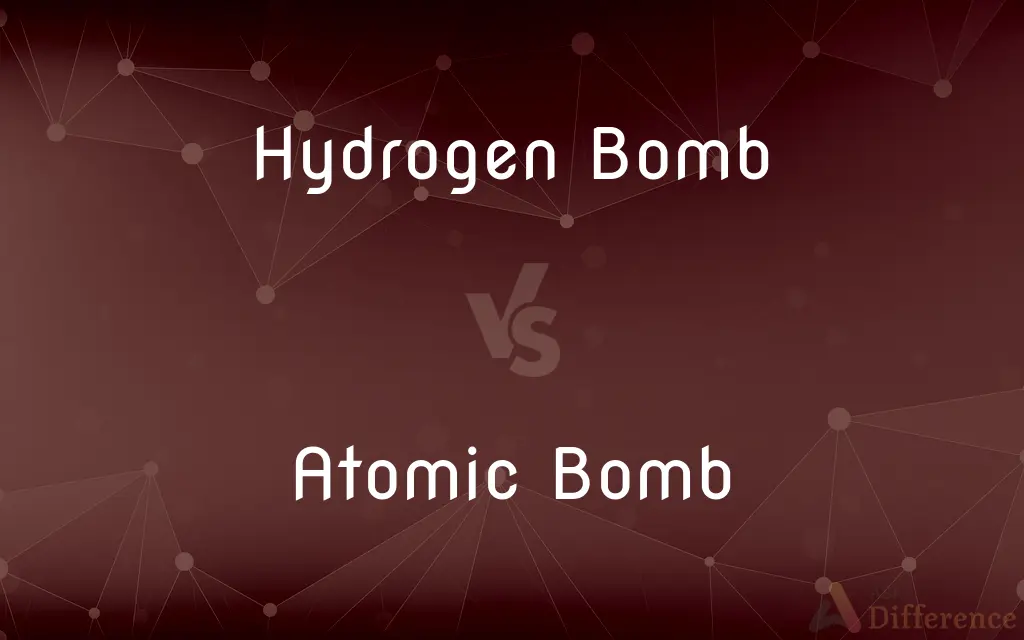Hydrogen Bomb vs. Atomic Bomb — What's the Difference?
By Tayyaba Rehman — Published on November 3, 2023
The hydrogen bomb (H-bomb) uses fusion of hydrogen isotopes, producing a much larger explosion, while the atomic bomb (A-bomb) relies on fission of atomic nuclei like uranium or plutonium.

Difference Between Hydrogen Bomb and Atomic Bomb
Table of Contents
ADVERTISEMENT
Key Differences
Both the hydrogen bomb and atomic bomb are nuclear weapons, but their operational mechanisms differ significantly. The hydrogen bomb utilizes fusion, where lightweight nuclei, typically isotopes of hydrogen, are combined under extremely high temperatures and pressures.
On the other hand, the atomic bomb exploits the process of fission, where heavier atomic nuclei like uranium or plutonium are split into smaller parts. The energy released during fusion in a hydrogen bomb is considerably higher than fission in an atomic bomb. This makes the H-bomb vastly more powerful. Despite their differences, a hydrogen bomb often uses an atomic bomb as a trigger to achieve the necessary conditions for fusion.
Both weapons are devastating, with the capability to cause unparalleled destruction, but the hydrogen bomb is often viewed as the more advanced and potent of the two.
Compare with Definitions
Hydrogen Bomb
Hydrogen Bomb means a next-generation nuclear device post atomic bomb.
After the atomic bomb's invention, researchers moved to develop the hydrogen bomb.
Atomic Bomb
Atomic Bomb denotes the first type of nuclear weapon.
The atomic bomb changed global military strategies after WWII.
ADVERTISEMENT
Hydrogen Bomb
Hydrogen Bomb implies a device merging hydrogen isotopes.
Scientists worried about the global implications of using a hydrogen bomb.
Atomic Bomb
Atomic Bomb means a weapon causing significant blast and radiation.
Survivors of the atomic bomb faced long-term health consequences.
Hydrogen Bomb
Hydrogen Bomb indicates a bomb typically triggered by atomic explosion.
The atomic stage of the hydrogen bomb ignites the fusion process.
Atomic Bomb
Atomic Bomb refers to a nuclear weapon using fission.
The atomic bomb dropped on Hiroshima caused massive destruction.
Hydrogen Bomb
Hydrogen Bomb refers to a nuclear weapon using fusion.
The explosion from the hydrogen bomb was significantly larger than anticipated.
Atomic Bomb
Atomic Bomb implies a device splitting atomic nuclei.
The discovery of nuclear fission led to the development of the atomic bomb.
Hydrogen Bomb
Hydrogen Bomb denotes a weapon more powerful than the atomic bomb.
The nation tested its first hydrogen bomb in a remote location.
Atomic Bomb
Atomic Bomb indicates a bomb utilizing uranium or plutonium.
The core of the atomic bomb was made of enriched uranium.
Hydrogen Bomb
Attack with a hydrogen bomb
Common Curiosities
When was the atomic bomb first used in warfare?
The atomic bomb was first used in warfare in 1945, on Hiroshima and Nagasaki.
What process does the atomic bomb rely on?
The atomic bomb relies on fission.
Which bomb uses fusion?
The hydrogen bomb uses fusion.
What are the primary materials in an atomic bomb?
The primary materials are uranium or plutonium.
Can a hydrogen bomb be detonated without an atomic bomb?
Typically, a hydrogen bomb uses an atomic bomb as a trigger to achieve fusion conditions.
Can these bombs affect global climate?
Yes, especially large detonations can influence the global climate, causing phenomena like "nuclear winter."
Is the hydrogen bomb more powerful than the atomic bomb?
Yes, the hydrogen bomb is generally more powerful than the atomic bomb.
Which countries have tested hydrogen bombs?
Several countries, including the U.S., Russia, and North Korea, have claimed to test hydrogen bombs.
Were atomic bombs used in any other wars besides WWII?
No, atomic bombs were only used in warfare during WWII.
What triggers the fusion in a hydrogen bomb?
Often, an atomic bomb is used as a trigger for the fusion in a hydrogen bomb.
How does fusion in the hydrogen bomb work?
Fusion in the hydrogen bomb involves combining light nuclei, typically hydrogen isotopes, under extreme conditions.
Are there efforts to reduce these weapons globally?
Yes, there have been international efforts and treaties aiming to reduce and eventually eliminate nuclear weapons.
What's the main difference in energy release?
The hydrogen bomb releases extremely high energy due to fusion, while the atomic bomb releases high energy from fission.
Which bomb produces more radiation?
Both bombs produce significant radiation, but the atomic bomb is particularly known for its immediate radioactive fallout.
Are these weapons banned internationally?
While there are treaties limiting testing and proliferation, not all nations have disarmed.
Share Your Discovery

Previous Comparison
GPRS vs. 3G
Next Comparison
Paraffin Wax vs. Candle WaxAuthor Spotlight
Written by
Tayyaba RehmanTayyaba Rehman is a distinguished writer, currently serving as a primary contributor to askdifference.com. As a researcher in semantics and etymology, Tayyaba's passion for the complexity of languages and their distinctions has found a perfect home on the platform. Tayyaba delves into the intricacies of language, distinguishing between commonly confused words and phrases, thereby providing clarity for readers worldwide.
















































